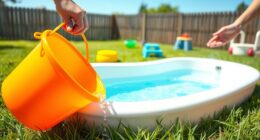To support your child’s executive function skills between ages 2 and 5, create routines, set clear boundaries, and teach self-control techniques like deep breaths or counting to ten. Engage them in problem-solving activities like puzzles or sharing games, and encourage independent thinking with guiding questions. Use play and environment to practice new skills patiently and consistently. Keep nurturing these abilities, and you’ll discover more ways to help your child grow smarter and more self-regulated over time.
Key Takeaways
- Establish consistent routines and clear boundaries to help children develop self-control and emotional regulation.
- Engage in activities like puzzles and role-playing to promote problem-solving and executive function skills.
- Teach coping strategies such as deep breaths and counting to ten to manage frustrations effectively.
- Encourage independent thinking by asking guiding questions and celebrating efforts to build confidence.
- Create a safe, distraction-free environment for practice, breaking tasks into manageable steps to enhance focus.

Have you ever wondered how young children manage to follow rules, control impulses, or switch between tasks? It’s fascinating to see them navigate these challenges at such a young age. These skills are part of what experts call executive function, a set of mental processes that help children plan, focus, remember, and regulate their behavior. As a parent, your role in nurturing these abilities is essential during early childhood, especially between ages 2 and 5, when these skills are rapidly developing.
One of the most effective ways to support your child’s executive function is by teaching self control strategies. These are techniques that help children manage their impulses and emotions. For example, you can encourage them to take deep breaths when they’re upset or frustrated, or teach them to count to ten before reacting. Setting clear, consistent boundaries also helps children understand what’s expected of them, making it easier for them to practice self-control. Incorporating routines creates a predictable environment, reducing impulsive reactions and helping children feel secure enough to practice patience and restraint.
Problem solving skills are another essential aspect of executive function that you can foster through everyday activities. When your child faces a challenge—like building a tower or sharing toys—you’re helping them develop the ability to think critically and find solutions. Instead of immediately stepping in to fix the problem, guide them to consider different options. Ask questions like, “What could you try next?” or “How might you make this work?” These prompts encourage independent thinking and resilience. Celebrating their efforts, even when the outcome isn’t perfect, boosts their confidence and motivates them to keep trying.
Creating opportunities for your child to practice these skills in safe, age-appropriate ways is key. Play is an excellent platform for developing executive function. Puzzles, role-playing games, and activities that require turn-taking teach children to plan, wait, and regulate their impulses. Limiting distractions during tasks and breaking activities into manageable steps also supports their problem solving and self-control. Remember, patience is fundamental; executive function develops gradually, and children need your guidance and encouragement along the way. Additionally, understanding that shark behaviors can influence safety during water activities can help you prepare and set boundaries when introducing your child to aquatic environments.
Frequently Asked Questions
How Can I Tell if My Child’s Executive Function Skills Are Developing Normally?
You can tell if your child’s executive function skills are developing normally by observing their progress in reaching key developmental milestones related to brain maturity. For example, they should start showing improved attention, self-control, and problem-solving abilities around age 3 to 5. If they struggle markedly or lag behind peers in these areas, it may indicate a need for further evaluation. Regularly engaging in age-appropriate activities helps support healthy development.
What Activities Best Support Executive Function Development in Toddlers?
You can boost your toddler’s executive function by engaging them in playful tasks that involve problem solving, like puzzles or simple matching games. These activities naturally promote focus, memory, and self-control. Incorporate daily routines that require decision-making, such as choosing snacks or sorting laundry. You might be surprised how these fun challenges strengthen their ability to plan, organize, and regulate emotions—all essential for healthy development.
How Does Diet Influence Executive Function in Young Children?
Your child’s diet has a significant nutritional impact on their executive function development. Proper nutrition supports brain growth, attention, and self-control. Following dietary guidelines guarantees they receive essential nutrients like omega-3 fatty acids, iron, and vitamins, which boost cognitive abilities. By offering balanced meals rich in fruits, vegetables, and healthy proteins, you help enhance their memory, problem-solving, and impulse control, laying a strong foundation for future learning and development.
When Should I Consider Consulting a Specialist for Executive Function Concerns?
Think of your child’s development as a delicate garden needing expert care. If you notice persistent struggles with attention, impulse control, or problem-solving that don’t improve despite support, it’s time to consult a specialist. They’ll use diagnostic criteria to identify concerns early. Early intervention can be the catalyst that helps your child’s executive function skills blossom, ensuring they thrive both now and in the future.
Can Screen Time Negatively Affect Executive Function Development in Preschoolers?
Screen time can negatively affect your preschooler’s cognitive development, including their executive function skills. Excessive or passive screen time may hinder their ability to focus, problem-solve, and self-regulate. To support healthy development, set limits on screen time, encourage active and interactive activities, and prioritize play and face-to-face interactions. By managing screen exposure, you help promote stronger executive function skills essential for your child’s growth.
Conclusion
By encouraging your child’s play, routines, and patience, you’re helping build their executive function skills. Remember, you’re laying the foundation for their future success—it’s all about planting seeds now for a fruitful harvest later. Stay consistent, be supportive, and trust that small steps lead to big gains. Keep in mind, Rome wasn’t built in a day, so give yourself grace as you guide your little one through these important years.









